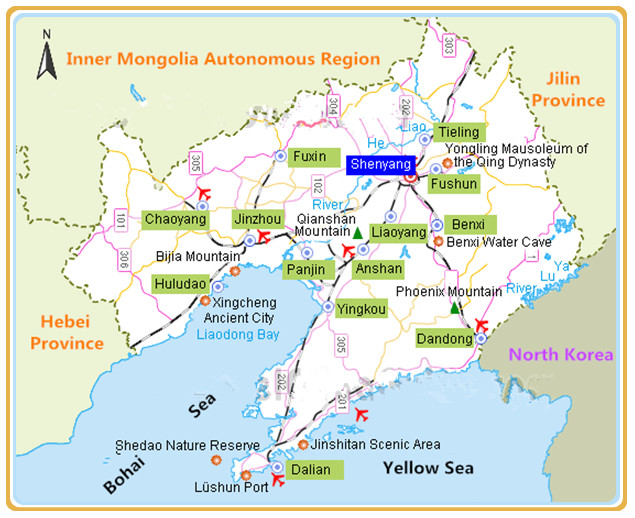 Liaoning Province, often called 'the Golden Triangle' because of its superior geographical location, includes boundaries on the Yellow Sea, the Bohai Gulf, and the Yalu River, which makes it the closest gateway to the Korean Peninsula. With Shenyang as the capital city, Liaoning is one of the important old industrial bases in China as the equipment manufacturing industry and the raw material industry are relatively developed. It is also the main transportation route from northeast China to Beijing and a major gateway to opening up. The total length of the Liaoning railway has been up to 6,132.4 kilometers long, ranking first in China. There are many port groups along the coast as well.
Liaoning Province, often called 'the Golden Triangle' because of its superior geographical location, includes boundaries on the Yellow Sea, the Bohai Gulf, and the Yalu River, which makes it the closest gateway to the Korean Peninsula. With Shenyang as the capital city, Liaoning is one of the important old industrial bases in China as the equipment manufacturing industry and the raw material industry are relatively developed. It is also the main transportation route from northeast China to Beijing and a major gateway to opening up. The total length of the Liaoning railway has been up to 6,132.4 kilometers long, ranking first in China. There are many port groups along the coast as well. Facts of Liaoning
Chinese Name: 辽宁 (liáo níng)
Abbreviation: Liao
Population: 43,517,000
Area: 148,000 square kilometers (57,143 square miles)
Location: in the northeast China
Administrative Division: 14 cities (Shenyang, Dalian, Anshan, Fushun, Benxi, Dandong, Jinzhou, Yingkou, Fuxin, Liaoyang, Panjin, Tieling, Chaoyang, Huludao)
GDP (2018): CNY 2,490.95 billion (USD 361.06 billion)
Nationalities: Han, Manchu, Mongol, Hui, Chaoxian, Xibe
Tourism Cities in Liaoning
| Anshan | Benxi | Chaoyang | Dalian | Fushun |
| Fuxin | Huludao | Jinzhou | Liaoyang | Dandong |
| Panjin | Shenyang | Tieling | Yinkou |
History of Liaoning
Archeological evidence establishes that community life existed in Liaoning 5,000 years ago. From its early beginnings through to the mid-20th Century, this place has been sought after as an important trade center, an area that contains rich, untapped resources, and for its strategic position as the Golden Triangle. Liaoning has been the birthplace of warlords and the cradle of the Qing Dynasty. Lasting from 1644 to the 1911 Revolution, this feudal dynasty was set up by invading Manchus. Unfortunately, the Manchus were not the last people to invade this area. Liaoning's often troubled history has given us an interesting legacy of architecture and artifacts, as well as archeological treasures, which combined with its transcendent natural beauty, makes the province an area you will want to visit many times. Below are a few highlights.
What to see in Liaoning?
A trip to Liaoning is full of endless surprises every day. What you want to see can be found in this city including charming seascape, long coastlines, many natural scenic spots, tourist resorts and historical sites such as the imperial mausoleums, palaces, temples and ancient city sites
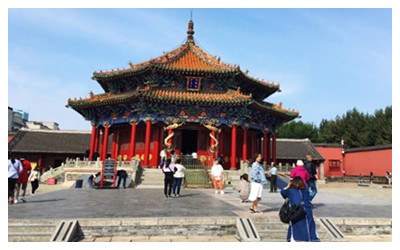 |
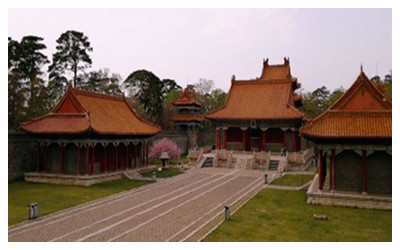 |
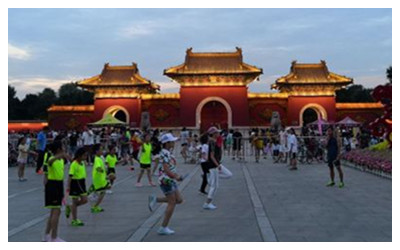 |
| Shenyang Imperial Palace | Fuling Mausoleum | Zhaoling Mausoleum |
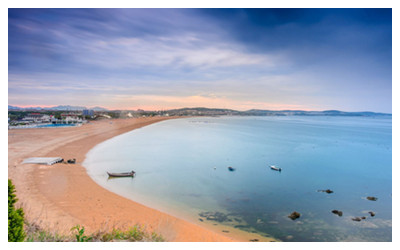 |
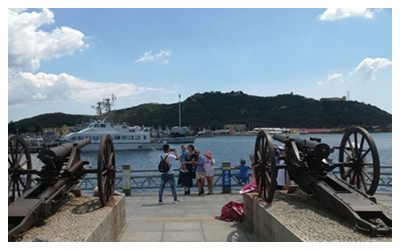 |
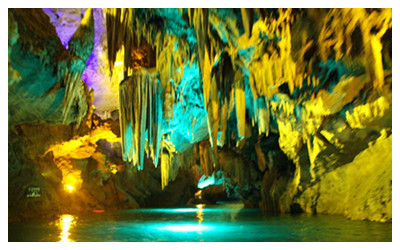 |
| Lushun Port Arthur | Benxi Water Cave | |
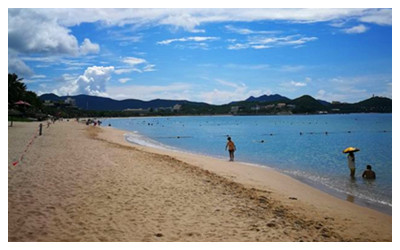 |
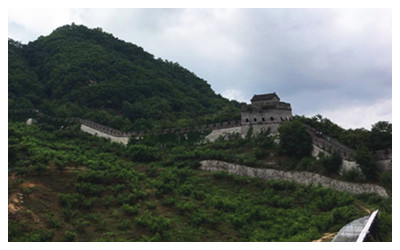 |
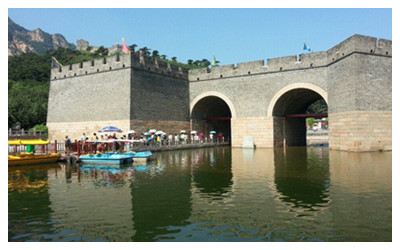 |
| Tiger Beach Ocean Park | Hushan Great Wall | Jiumenkou Great Wall |
When to visit Liaoning?
Continental climate characterized by long and cold winters, warm and rainy summers and comparatively short and windy spring and autumn. January is the coldest month with an average temperature of -17ºC - 5ºC, and July is the hottest with an average temperature of 21º C- 25ºC. Annual rainfall of this province averages from 450 millimeters to 1150 millimeters. Liaoning is the province in northeast China having the most sunlight, heat, and rainfall. The best time to visit is from May to October, but winter is also a pleasant time to enjoy the ice and snow scenery and winter festivals.
How to reach Liaoning?
Since Jan. 1, 2018, the 144-hour visa-free transit scheme has been implemented in Liaoning for citizens from 53 countries and regions including USA, UK, Australia, Canada, France, Germany, Italy, Denmark, Netherlands, Spain, etc., and Shenyang Taoxian Airport and Dalian Zhoushuizi Airport are the entry / exit ports.
Liaoning Travel Tips
Dalian Spring Fireworks Festival, Dalian Chinese Scholar Tree Blossom Affairs, Dalian International Fashion Festival, and Shenyang International Ice and Snow Festival. Consider planning your trip to include one of the local wonderful festive events.






